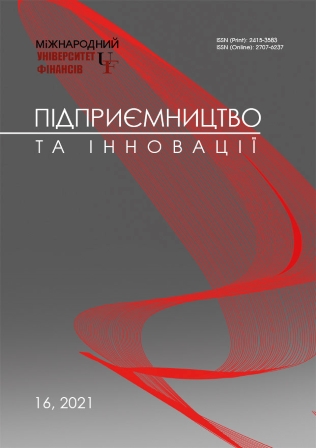FISCAL CAPACITY OF INDIRECT TAXES IN THE CONDITION OF SHADOW ECONOMY
Abstract
The recent growth of the shadow economy has prompted all countries' governments to look for effective tools to combat this phenomenon. The impact of the shadow economy on various aspects of state development is complex and requires detailed analysis. The shadow economy's exact definition is quite difficult because the shadow economy is constantly evolving, adapting to the changes taking place in both the economy and society. Factors that lead to increased shadowing include high crime rates, high bureaucratization, lack of an effective system of control and punishment for informal employment and non-taxation of wages, imperfect monetary regulation, inefficient tax administration, low control over the use of budget funds, inconsistencies, and duplication of the legal and regulatory framework, electronic trading systems and real estate networks. The shadowing of the economy significantly affects economic processes. As a result, the state loses an excessive amount of money that does not go to the state budget in tax revenues. It is indirect taxes in a growing shadow economy that are an instrument of criminal schemes. At the same time, indirect taxes are considered one of the most important and complex taxes in the domestic tax system. Therefore, a detailed analysis of their administration and budget revenues is important for taxpayers and the state represented by its executive bodies. An in-depth analysis in terms of indirect taxes shows that the main one from the standpoint of budgeting is the value added tax. In general, this tax plays a key role in generating state budget revenues, as it is the least prone to fluctuations in world prices for raw materials and energy compared to other budget-generating taxes. At the same time, it remains one of the most problematic taxes in the domestic tax system. As tax evasion is currently the largest component of the value added tax deficit, it is necessary to determine the extent to which value added tax revenues can be increased by ensuring more efficient tax collection in the medium and long term, other things being equal. Given the study, it can be argued that the improvement of the existing system of administration of indirect taxes will allow in the shadow economy to introduce mechanisms for withdrawing liquid assets from the shadows in order to deepen the fiscal function of indirect taxes.
References
Андрущенко В.Л., Тучак Т.В. Морально-етичні імперативи податків та оподаткування (західна традиція) : монографія. Київ : Алерта, 2013. 384 с.
Варналій З.С. Теоретичні засади детінізації економіки України. Вісник Вінницького політехнічного інституту: економіка та менеджмент. 2014. № 1. С. 47–53.
Дадашова П.А., Кладова М.П. Вплив тіньової економіки на економічну безпеку України. Ефективна економіка. 2016. Вип. 11. URL: http://www.economy.nayka.com.ua/?op=1&z=5271
Загальні тенденції тіньової економіки в Україні у 2019 році. URL: https://www.me.gov.ua/?lang=uk-UA (дата звернення: 07.02.2021).
Крисоватий А.І., Томнюк Т.Л. Адміністрування податків в Україні: організація та напрями трансформації : монографія. Тернопіль : Економічна думка, 2012. 212 с.
Офіційний сайт Головного управління ДПС у Херсонській області. URL: https://kherson.tax.gov.ua/dfs-u-regioni/golov-upr/kontakti-/ (дата звернення: 26.01.2021).
Офіційний сайт Міністерства розвитку економіки, торгівлі та сільського господарства України. URL: https://www.me.gov.ua/?lang=uk-UA (дата звернення: 08.02.2021).
Податковий кодекс України : Закон України від 02.12.2010 № 2755- VI. URL: http://zakon3.rada.gov.ua/laws/ show/2755-17 (дата звернення: 05.02.2021).
Річний звіт про виконання державного бюджету за 2015–2019 роки. Офіційний сайт Державної казначейської служби України. URL: https://www.treasury.gov.ua/ua/file-storage/vikonannya-derzhavnogo-byudzhetu (дата звернення: 28.01.2021).
Сідельникова Л.П. Ефективність податкових джерел формування бюджетних ресурсів держави. Фінанси України. 2015. № 9. С. 45–60.
Чижова Т.В. Сучасні реалії адміністрування ПДВ та вирішення проблем його гармонізації. Вісник Бердянського університету менеджменту і бізнесу. 2011. № 1(13). С. 96–99.
Andrushchenko V.L., Tuchak T.V. (2013) Moralno-etychni imperatyvy podatkiv ta opodatkuvannia (zakhidna tradytsiia) [Moral and ethical imperatives of taxes and taxation (Western tradition)]. Kyiv: Alerta. (in Ukrainian)
Varnalii Z.S. (2014) Teoretychni zasady detinizatsii ekonomiky Ukrainy [Theoretical principles of de-shadowing of Ukraine's economy]. Bulletin of Vinnytsia Polytechnic Institute: Economics and Management, no. 1, рр. 47-53.
Dadashova P.A., Kladova M.P. (2016) Vplyv tinovoi ekonomiky na ekonomichnu bezpeku Ukrainy [The impact of the shadow economy on the economic security of Ukraine]. Efficient economy, vol. 11. Available at: http://www.economy.nayka.com.ua/?op=1&z=5271 (accessed 07 February 2021).
Zahalni tendentsii tinovoi ekonomiky v Ukraini u 2019 rotsi [General trends of the shadow economy in Ukraine in 2019]. Available at: https://www.me.gov.ua/?lang=uk-UA (accessed 07 February 2021).
Krysovatyi A.I., Tomniuk T.L. (2012) Administruvannia podatkiv v Ukraini: orhanizatsiia ta napriamy transformatsii [Tax administration in Ukraine: organization and directions of transformation]. Ternopil: Economic Thought of TNEU. (in Ukrainian)
Ofitsiinyi sait Holovnoho upravlinnia DPS u Khersonskii oblasti [The official site of the Main Directorate of the STS in Kherson region]. Available at: https://kherson.tax.gov.ua/dfs-u-regioni/golov-upr/kontakti-/ (accessed 26 January 2021).
Ofitsiinyi veb-sait Ministerstva ekonomichnoho rozvytku ta silskoho hospodarstva Ukrainy [Official site of the Ministry of Economic Development, Trade and Agriculture of Ukraine]. Available at: https://www.me.gov.ua/?lang=uk-UA (accessed 08 February 2021).
Podatkovyi kodeks Ukrainy: Zakon Ukrainy vid 02.12.2010 № 2755 -VI [Tax Code of Ukraine: Law of Ukraine dated 27.12.2010 № 2755-VI]. Available at: http://zakon3.rada.gov.ua/laws/ show/2755-17 (accessed 16 January 2021).
Richnyi zvit pro vykonannia derzhavnoho biudzhetu za 2015-2019 roky. [Annual report on the implementation of the state budget for 2015-2019]. Official site of the State Treasury Service of Ukraine. Available at: https://www.treasury.gov.ua/ua/file-storage/vikonannya-derzhavnogo-byudzhetu (accessed 10 January 2021).
Sidelnykova L.P. (2015) Efektyvnist podatkovykh dzherel formuvannia biudzhetnykh resursiv derzhavy [Efficiency of tax sources of formation of budgetary resources of the state]. Finance of Ukraine, no. 9, рр. 46-60.
Chyzhova T.V. (2011) Suchasni realii administruvannia PDV ta vyrishennia problem yoho harmonizatsii [Modern realities of VAT administration and solving the problems of its harmonization]. Bulletin of Berdyansk University of Management and Business: Science. economy. magazine, no. 1(13), рр. 96-99.



